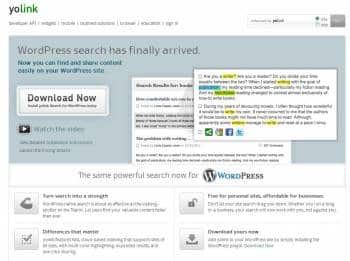For some time now, WordPress sites have been well known for their vast amounts of information, and content. This presents both an opportunity, and a problem. A WordPress site might have the information a visitor is searching for, but due to poor organization, it may be difficult for the visitor to locate that much needed information.

Some WordPress sites have a search bar that can be used to search the site, but oftentimes the results are less than stellar. A site visitor could also use the Google search bar for the WordPress site, but while the retrieved results are relevant to the keywords being searched for, the results themselves could lead the visitor away from the original site, thus greatly increasing the site’s bounce rate, and decreasing the stickiness of the site. What is needed is a search engine application that allows a visitor to search the original WordPress site, and deliver results that are relevant and useful while remaining on that particular site. Thanks to the efforts of TigerLogic, and WP Engine, the Yolink search plugin for WordPress was developed to help bring better search results for WordPress sites of various niches, and interests.
The Yolink plugin, which utilizes cloud-based indexing, is easy to install, and can quickly re-index the content of a site to provide accurate, and completely customizable search results. After downloading the plugin (as of this writing, for free) from the website: http://www.yolink.com/yolink/wordpress/, WordPress site owners can go through the process of installing and activating this plugin. There are a few short setup steps, but once those are done, Yolink goes about crawling the WordPress site in order to create a better search database that visitors will quickly find returns much better results than the original WordPress search bar, or Google search bar.
To better understand the difference between the built in WordPress search API, Google search bar, and Yolink, let’s imagine that we wish to search through a business website, and the search term is “business plan”. With the present WordPress built in search API, we would get several entries, many of which would be vaguely relevant to the term “business plan”. There is even the possibility of an entry with the words “business plan” in the title of the entry appearing much further down the list of search results. Using the Google search bar in the same situation, we would get relevant results, but most of the entries would be for blog posts, or sites that are not related to the site that we are currently visiting. In this respect, Yolink is superior to other search options. Yolink would give strong, relevant search results for the WordPress site that we are currently viewing, without listing other options that might lead us from the original site.
Something else that is really great about the Yolink plugin is that, upon activation, the share buttons for various social media sites would now be present on each of the site entries, and thus making it easier for visitors to share the site’s content with family, friends, and co-workers. Getting a piece of content on a WordPress site to go viral is now much easier thanks to the Yolink plugin. Also, with the Yolink plugin, visitors would be able to “look behind” clickable links, and see the searched for search terms in context to the rest of the site content without actually clicking through the links. Plus, visitors do not have to share the whole piece of content if they only find a part of the content interesting or worth sharing. With the Yolink plugin, it would be possible to pick out snippets, and pieces of content to share on social media sites like Twitter, and Facebook.
In short, the positive implications of this plugin are practically limitless. For example, many people were adversely affected by the recent Google Panda update. Although there are many factors that go into deciding which sites were to remain in the top placings, one of the deciding factors was the stickiness of a site. The fact is, many site visitors leave a site, not because the content they are looking for isn’t there, but because they were unable to FIND the desired content. With the Yolink plugin, site visitors will now be able to search a site much more successfully, and hopefully find the content that meets their needs, or most interests them. An even better caveat is that the time that is taken to use the Yolink search bar will greatly increase the time a visitor spends on a site, and that is a definite plus in regards to SEO.